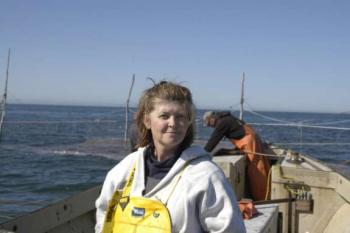Shareen Davis

The Working Waterfront Festival Community Documentation Project
This project documents the history and culture of the commercial fishing industry and other port trades. The project began in 2004 in conjunction with the Working Waterfront Festival, an annual, educational celebration of commercial fishing culture which takes place in New Bedford, MA. Interviewees have included a wide range of individuals connected to the commercial fishing industry and/or other aspects of the port through work or familial ties. While the majority of interviewees are from the port of New Bedford, the project has also documented numerous individuals from other ports around the country. Folklorist and Festival Director Laura Orleans and Community Scholar and Associate Director Kirsten Bendiksen are project leaders. The original recordings reside at the National Council for the Traditional Arts in Maryland with listening copies housed at the Festival's New Bedford office.
Azure Dee Westwood
Shareen Davis is a fifty-year-old woman from Chatham, Massachusetts. She is a 13th generation Cape Codder with a rich history in the fishing industry. Davis owns a weir fishing business and provides shore support. She has also been a fisherman in the past and is a community activist. Her home port and hail port are both in Chatham, MA, specifically Stage Harbor. Davis comes from a fishing family, with her grandfather and uncles being fishermen and her mother working in the industry. She met her husband, Ernie, in a coffee shop where a group of fishermen would come in for breakfast. Davis worked in a fish market and retail for a while, but always helped out at the dock during the fish season. Davis is also a political activist, often speaking out for people and addressing issues of injustice. She was politically active even in high school. She has learned valuable lessons from three women in town who were voices in the fisheries themselves, including her grandmother, the wife of a fisherman, Eileen Our, a fisherman's wife and a teacher, and Cassy Abrew, the shellfish warden in town. Davis has two daughters who are very interested in the fishing industry and understand its importance to the community. She has taught them how to run a boat. She is also involved in a new organization of fishermen's wives who are seeking to have a better voice in the community.
Scope and Content Note
This interview with Shareen Davis, conducted on September 22, 2007, provides a detailed account of her life, her family's involvement in the fishing industry, and her role as a community activist in Chatham, Massachusetts. The interview covers a range of topics including Davis's background and history, her family's involvement in fishing, the roles of women in her family and community, and her own experiences as a fisherman and community activist . Davis discusses the influence of three women in her life who were involved in the fisheries and how they shaped her understanding of the industry and her role within it. Davis also talks about her daughters' interest in fishing and their understanding of its importance to the community. She shares how she met her husband and her journey from working in a fish market to becoming a community activist. The interview also touches on the political issues affecting the fishing industry and the need for a more community-driven approach to managing the industry. Davis discusses her advocacy work, including her efforts to get an Act of Congress to dredge the harbor, and the networking opportunities that arose from her activism. She also talks about her involvement with the Hook Fishermen's Association and her disagreements with their philosophy and practices. She also discusses the formation of a new women's organization in the community and the decline of women's involvement in fishing. Davis expresses frustration with the politics and challenges of working in the fishing industry. In the interview, Davis also discusses her family's involvement in the fishing industry and the importance of maintaining the historic and ecological value of fishing. She talks about her daughters' involvement in the industry and their focus on fisheries and community. Davis shares her experiences as a woman in the industry and the challenges she faced. She emphasizes the importance of taking opportunities and respecting the environment. She also discusses the need for unity and collaboration within the fishing community. The interview provides valuable insights into the experiences of women in the fishing industry, the challenges they face, and the role of community activism in addressing these challenges. It also provides a unique perspective on the fishing industry in Chatham, Massachusetts, and the importance of preserving its historic and ecological value.
Please Note: The oral histories in this collection are protected by copyright and have been created for educational, research and personal use as described by the Fair Use Doctrine in the U.S. Copyright law. Please reach out Voices@noaa.gov to let us know how these interviews are being used in your research, project, exhibit, etc. The Voices staff can help provide other useful resources related to your inquiry.
The NOAA mission is to understand and predict changes in climate, weather, oceans, and coasts, to share that knowledge and information with others, and to conserve and manage coastal and marine ecosystems and resources. The Voices Oral History Archives offers public access to a wide range of accounts, including historical materials that are products of their particular times, and may contain offensive language or negative stereotypes.
Voices Oral History Archives does not verify the accuracy of materials submitted to us. The opinions expressed in the interviews are those of the interviewee only. The interviews here have been made available to the public only after the interviewer has confirmed that they have obtained consent.
